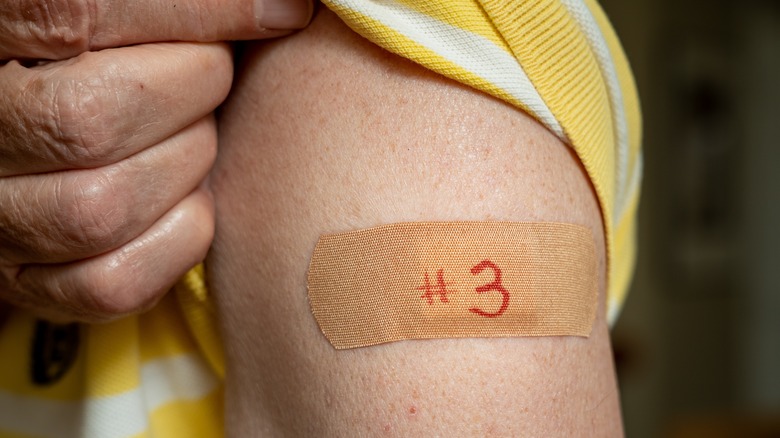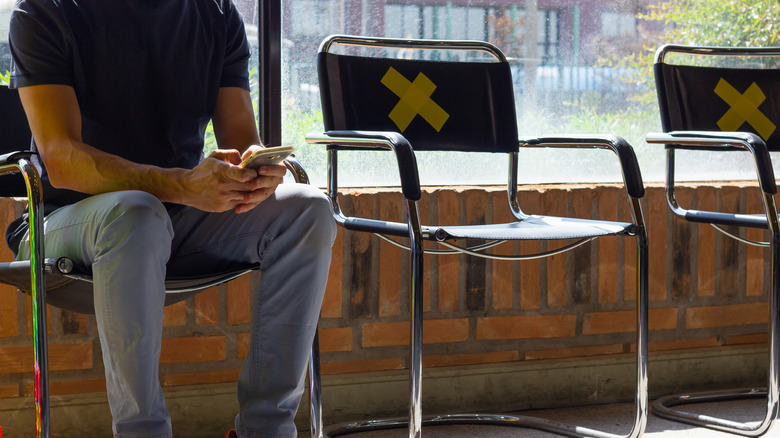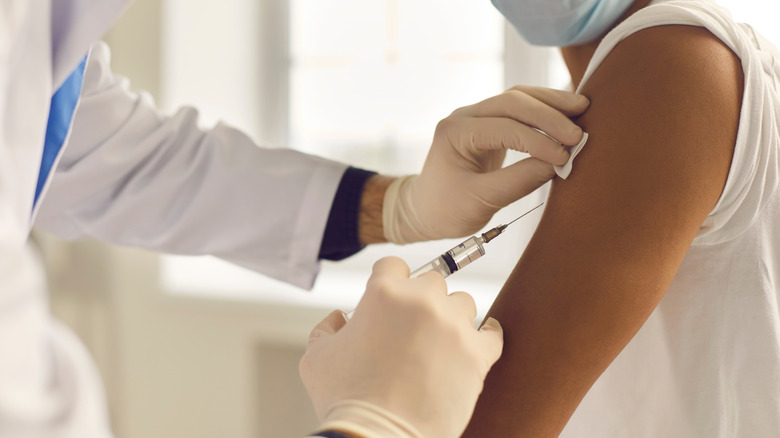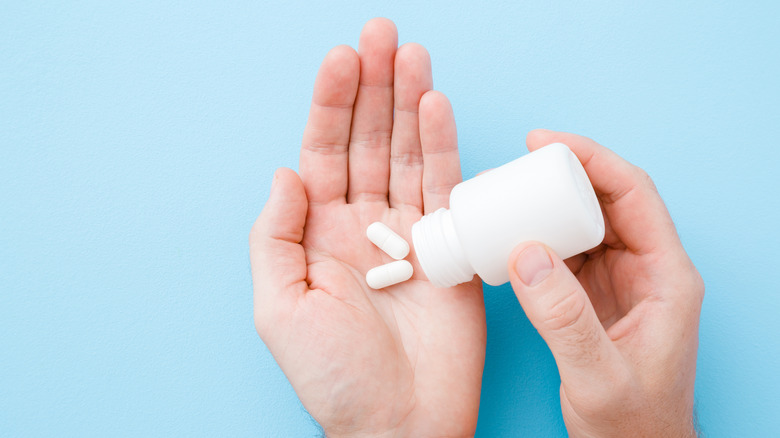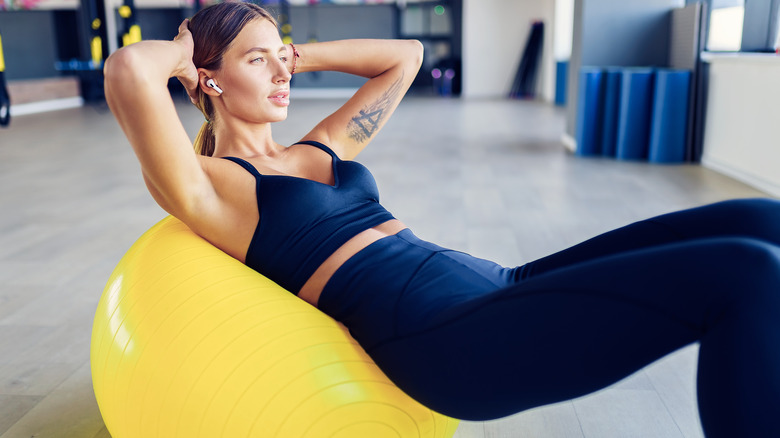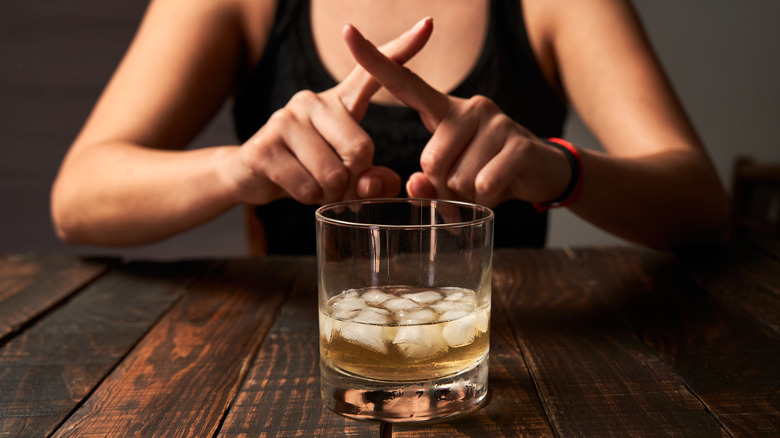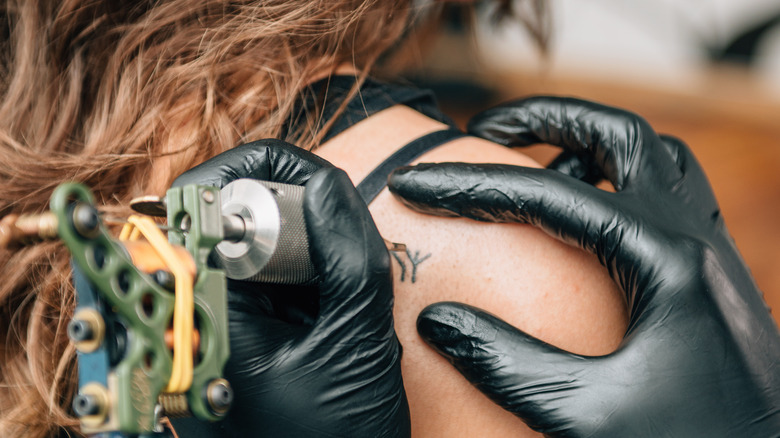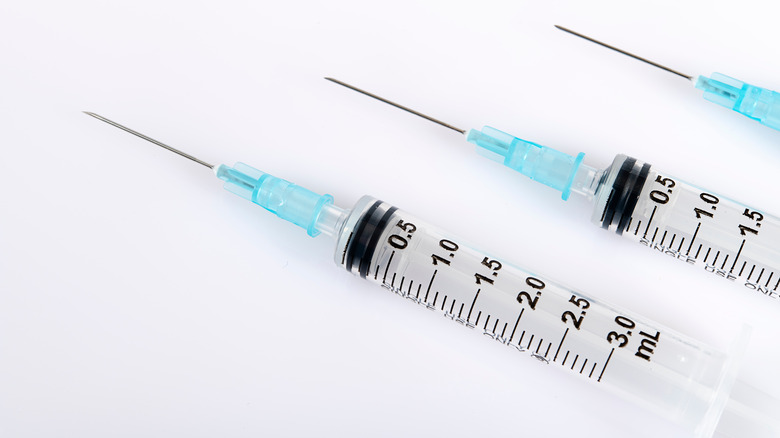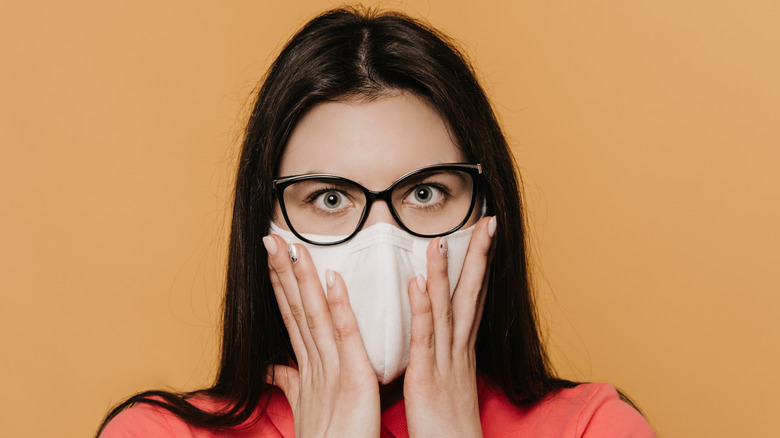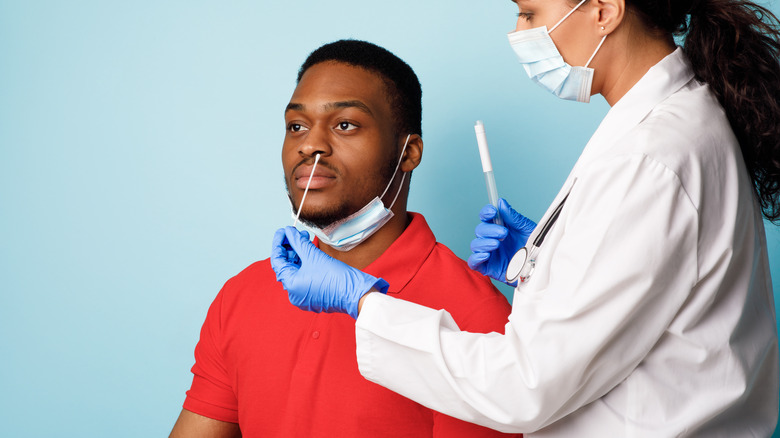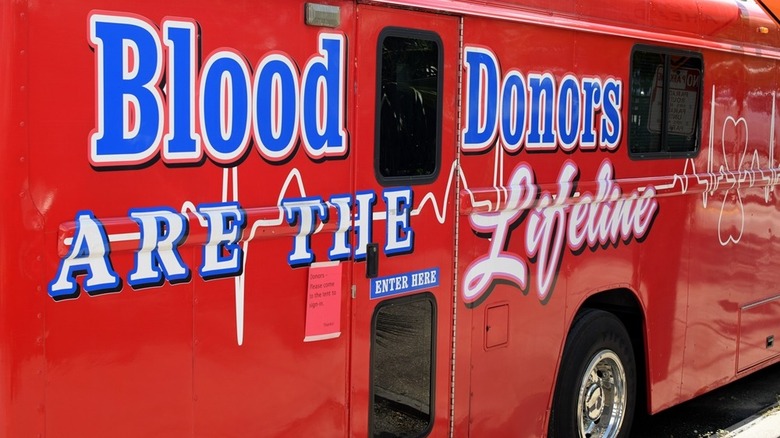Things You Shouldn't Do After Getting The COVID-19 Booster Shot
Getting fully vaccinated and boosted against COVID-19 continues to be the top priority in the war against the deadly virus. While the Delta variant remained the dominant strain for a while, its highly contagious cousin, Omicron, swiftly took over by December 21 (via CNN).
The Omicron variant is so new that there are "lots of unknowns about the transmissibility, the severity, [and] the vaccine impact," the COVID-19 White House response team said in a December press briefing. However, it's clear what everyone can do right now to prepare for a new wave of infections. "From the preliminary data ... we have every reason to believe that the booster with the standard vaccine should hold us well [against the Omicron variant]," said Dr. Anthony Fauci, chief medical advisor on COVID-19 to the president, in a CNN interview. Similarly, U.S. Surgeon General Dr. Vivek Murthy told CBS, "There will be a stark difference between the experience of those who are vaccinated and boosted versus those who are unvaccinated" (via CNN).
For the best outcome, medical experts offer plenty of advice on how to optimize your experience. So let's take a look at some of the top things you shouldn't do after you receive your booster shot.
Don't skip the observation period
If you sailed through your last COVID-19 vaccine without experiencing a reaction, you might be tempted to head straight out the door after receiving your booster shot. For the majority of people, that idea might be perfectly okay. However, as many state health departments, including Oregon Health Authority, have explained, you should still plan on waiting 15 to 30 minutes after getting your booster, much like you did after your initial vaccination.
According to Beth Moore, the interim chair and professor of Microbiology and Immunology at Michigan Medicine, "After their jab, most people will be asked to sit and wait a 15-minute observation period, to watch for rare allergic reactions. Those with a history of serious allergic reactions should prepare to wait up to 30 minutes." She continued, telling the University of Michigan, "Reactions have ranged from hives to anaphylactic shock and are quickly treated with Benadryl for a mild reaction or epinephrine for anaphylaxis."
Don't assume booster side effects will be exactly the same as before
Though your body's reaction to the COVID-19 booster shot will likely be similar to its response to the primary series, according to CNN, don't take it for granted. With mixing and matching COVID-19 boosters with COVID-19 vaccines, there's the possibility for a few more side effects to occur. But it's nothing to be overly worried about, according to healthcare professionals.
When you mix and match vaccines from different manufacturers, Dr. Charlotte Baker, a professor of epidemiology at Virginia Tech, explained that you could experience a different reaction afterward. "What may be happening is that the road map your body had for the first [vaccine] is a little different with a changed vaccine," she told NPR. "The new vaccine has to teach it a few more things, so you may get new side effects. The vaccines all are trying to do the same thing, but each has their own way of doing it."
Don't take an NSAID or antihistamine before your booster (unless advised otherwise)
If you had a bit of a headache, a mild fever, or some muscle aches with your last vaccine jab, it's pretty tempting to pop an Advil or Tylenol before your booster in preparation for the discomfort. But don't do it. Over-the-counter [OTC] anti-inflammatory and fever-reducing drugs like Advil and other NSAIDs could reduce your immune response if you take them before receiving the vaccine.
According to GoodRx Health, "While we don't have any studies on how OTC pain relievers affect your immune system's response to the COVID-19 vaccine, we do have some research that was done with other vaccines. In short: Pain relievers might cause a weaker response to the vaccine. This can possibly make the vaccine less effective." The CDC advises holding off on taking antihistamines before your COVID-19 shot for the same reason. But here's the good news: The experts agree it's perfectly fine to use those over-the-counter medications after your appointment.
Per the CDC, "You can take these medications to relieve post-vaccination side effects if you have no other medical reasons that prevent you from taking these medications normally" (via NBC Chicago). "It is not recommended you take these medicines before vaccination for the purpose of trying to prevent side effects." However, the agency advised that you should not stop taking medications if you need them "for underlying medical conditions."
Don't engage in strenuous exercise if you feel rundown
Listen to your body. Although there's no harm to exercise, don't be a hero if booster side effects hit you hard. Take a day off from your high-intensity cardio workout or do something less grueling, like walking, or gentle yoga and stretching, per Medical News Today.
The experts at the Cleveland Clinic agree that exercising is great for your body, and that "some evidence shows that people who maintain healthy lifestyles and exercise regularly seem to have enhanced responses to vaccines." However, don't overdo it immediately after your booster shot if you're not feeling up to it. Allow your body some time to recuperate. "You might find that after you get your shot, it could be a good day to just rest or do something less strenuous like just taking a walk. Recovery is part of exercising, too. It's not a bad thing to have a lighter workout day," the Cleveland Clinic advised.
Don't drink alcohol, or at least don't go overboard
So you got the booster and now you're meeting up with friends to celebrate? If you're planning on swigging back a few cocktails, just make sure the party doesn't get out of hand.
"A toast to celebrate the COVID vaccine is fine. But in general, too much alcohol can impact our immune system," said Dr. Natasha Bhuyan, a family medicine specialist and clinical assistant professor at the University of Arizona College of Medicine, Phoenix. "Alcohol is dehydrating and can exacerbate the post-vaccine symptoms people may feel, such as muscle aches or fatigue," she told Arizona Republic. Ideally, Dr. Bhuyan recommends waiting 48 hours after your appointment.
Dr. Mark Loafman, chair of family and community medicine for Cook County Health, told NBC Chicago, "We know in general that people who have used alcohol, excessive doses of alcohol, have a weakened immune system and that makes them more susceptible to infection and may weaken their response to a vaccine."
Don't get a tattoo right after the booster
Should you rush out for fresh ink right after getting your COVID-19 booster? As it turns out, there's really no hard and fast rule to put it off, but you should use some caution. "Based on how the various vaccines work, whether mRNA or adenoviral vector-based, there isn't any reason to think getting a tattoo would influence how well the vaccines work," said Dr. Michael L. Chang, pediatric infectious disease specialist at McGovern Medical School at UTHealth in Houston. However, there are some things to consider, especially if the ink is destined for your arm, he told Allure. "A local infection after tattoo may need antibiotic therapy, and you don't want to blow it off and blame the vaccine," warned Chang.
It's best to wait at least a couple of days (but longer is better) after your vaccine or booster if your new tattoo is going to be near the injection site. San Diego-based board-certified family medicine physician Dr. Abisola Olulade pointed out to Allure that you could wind up with soreness in "two different areas of the body that are painful at the same time [and that] may be challenging for a lot of people."
Don't delay getting other immunizations
A lot of people have a fear of needles, including about 76 million Americans (via Los Angeles Times). This likely contributes to some of the vaccine hesitancy. If you have trypanophobia and it's holding you back from not only a COVID-19 vaccine, booster, or other crucial shots, you may want to consider scheduling all of your inoculations in one visit. One and done! Combining appointments will save you both time and unnecessary distress.
Dr. Hila Beckerman, a pediatrician with extensive vaccine experience based in Delray Beach, Florida, told the Sun Sentinel, "Each vaccine works by making antibodies to a specific protein found on that virus or bacteria. When you get the COVID vaccine, your body makes antibodies specifically against the spike protein on the outside of the COVID virus. Those antibodies don't affect a different virus or bacteria." This means you can get multiple vaccines at once.
You have probably already received lots of vaccinations together. Dr. David Buchholz, senior founding medical director for primary care at ColumbiaDoctors in New York City, explained in a Q&A with the Columbia University Irving Medical Center that "at 2 months of age, we immunize infants against eight different diseases with minimal or no side effects." He continued, saying, "And it's convenient to get shots together so you don't have to schedule multiple visits." Buchholz also revealed that he chose to get the flu shot and Pfizer booster in one go.
Don't toss your masks
Suffice it to say, a lot of us would love to ditch the mask. However, the medical community agrees that masks are a necessary tool to reduce transmission (via CDC). Dr. Angela Branch, associate professor of infectious diseases and co-director of the Vaccine and Treatment Evaluation Unit at University of Rochester Medical Center, explained, "While being fully vaccinated is very effective at preventing severe illness and death, and boosters are about 90% effective at preventing symptomatic infection, there is a small possibility of having a mild or asymptomatic infection." As such, she advised wearing a face mask indoors in public areas.
Peak effectiveness is reached two weeks after the COVID-19 booster shot is given — the same as it was for the initial COVID-19 vaccine series. The booster increases your antibodies and boosts you back up to peak protection (via WebMD). "The bottom line is, we're not in lockdown anymore. If you wanna go out [and you're healthy and booster-protected], go out. Just be safe about it," Dr. Charlotte Baker, assistant professor of epidemiology at Virginia Tech, advised in an interview with NPR. While getting a booster means you're much safer from severe complications, you should adhere to the established safety protocols, especially indoor mask-wearing.
Don't avoid medical assistance if you have an unusual reaction
Most people experience only temporary and mild side effects lasting just a few days from the COVID-19 boosters, and some lucky folks don't get any reactions at all. The side effects — which range from injection site pain to headache to fever – are "normal signs that [your] body is building protection," according to the CDC. You can expect your booster side effects to be about the same as the side effects you experienced with the second dose of your initial vaccine, explained Johns Hopkins Medicine.
Although severe allergic reactions are rare, you should still keep a lookout for worrying side effects to the booster. The CDC advises calling your doctor "if the redness or tenderness where the shot was given gets worse after 24 hours, or if the side effects are worrying or do not seem to be going away after a few days." So if you are suffering through a reaction that seems really off the wall and intense, then do not hesitate to consult a health professional and seek prompt medical treatment, even calling 911 if it's severe.
Don't avoid getting tested for COVID-19 if you've been exposed or have symptoms
Even if you're fully vaccinated and boosted, you still need to get tested if you've had close contact with someone who has recently received a positive result, or if you develop symptoms yourself. Be aware that some people, including infants and children, may not even show any symptoms but can still carry "high levels of virus" and transmit it to others, per research reported in the Harvard Gazette.
"Close contact" is a term often used by experts when discussing possible exposures. The CDC defines it as "someone who was less than 6 feet away from an infected person ... for a cumulative total of 15 minutes or more over a 24-hour period." So whether you were within 6 feet from an infected person for one 15-minute period or three 5-minute increments, you've been in close contact.
Since the Delta variant came on the scene, evidence has shown that even if you're vaccinated there is a chance you can get a breakthrough infection and spread the virus to others (via Harvard Health Publishing). "A person with COVID-19 may be contagious 48 hours before starting to experience symptoms," the site explained. "People may actually be most likely to spread the virus to others during the 48 hours before they start to experience symptoms." If you learn you've been around someone with COVID-19, don't think you're in the clear just because you've had your COVID-19 booster shot. You still need to get tested.
Don't hesitate to donate blood
You may not realize this, but even if you've just received a COVID-19 vaccine or booster shot, you can donate blood — in most cases — right away without any waiting period. Additionally, giving blood does not reduce your protection against the virus. WebMD explained that when you donate a pint of blood, you lose about 10% of the total blood in your body. "If you've had the COVID-19 vaccine, your antibody levels won't go down after you give blood," the site confirmed. "Your immune system will quickly replace the antibodies."
If you're feeling healthy, have not been infected recently, and you received an FDA-approved or FDA-authorized COVID-19 vaccine or booster, the American Red Cross says they'd love to have you make an appointment to stop by. The organization and others like it are in desperate need of blood, platelet, and plasma donations. "The Red Cross is experiencing the worst blood shortage in over a decade. The dangerously low blood supply levels have forced some hospitals to defer patients from major surgery," the organization confirmed on its website. Just bring your vaccination card to verify the vaccine manufacturer. Go ahead and do it. Save a life!
Don't think you're invincible to the virus now
Congratulations! You've got the superpower of the booster. It gets you back to prime condition, or "optimal protection," to fight infection, severe disease, and hospitalization, according to Dr. Anthony Fauci, infectious disease expert and chief medical advisor to the president (via CNBC). But the struggle is not over. New variants continue to emerge and spread, such as Omicron, which is sweeping through populations faster than previous variants, the World Health Organization (WHO) warned (via CNBC).
"Reassuringly, it seems that booster vaccine doses can significantly improve protection against Omicron," Dr. Marcus Pereira, assistant professor of medicine in the Division of Infectious Diseases at Columbia University Vagelos College of Physicians and Surgeons, told Columbia University Irving Medical Center. "Most experts think that breakthrough infections should lead to milder symptoms," he explained.
Dr. Mallika Marshall, a board-certified physician in internal medicine and pediatrics, and a medical reporter at Boston's WBZ News explained that people who are vaccinated are far less likely to get COVID-19, "but if they do get a breakthrough infection, they can transmit the virus to others, but we're not sure to what degree." This is why, as she explained, it is vital for vaccinated individuals to still act with caution.

